- Home
- Bianca Blythe
Lords, Snow and Mistletoe Page 3
Lords, Snow and Mistletoe Read online
Page 3
Finally the clamor of people lessened, replaced by the more pleasant sounds of birds chirping—likely in wonder at the unseasonal temperature.
He scowled. His friends might also be visiting Yorkshire, but Frederick yearned to lock himself in his laboratory for the next year. Chemicals made far more sense than people.
Chapter Three
Stopping at inns was delightful.
Celia sipped the warm mulled wine. Cloves and oranges, ginger and cinnamon, warmed her.
Dark green garlands and crimson ribbons decorated the inn. A man played Yuletide songs on his fiddle, and some of the patrons lurched into a song that most likely sounded even more pleasant to their alcohol distracted ears.
“This is a lovely season,” Celia murmured.
Theodosia grimaced. “A few mistletoe hanging from the ceiling cannot distract from the overwhelming chill. If only I could wear a proper gown.”
“You mean a sheer one?” Celia’s lips twitched.
“It’s impossible to be dressed too finely, and this is very drab. I might as well be wearing some of your clothes.”
“Your mother did not desire us to attract notice when traveling.”
Even Lady Fitzroy recognized that ostentatious jewels and elaborate gowns might attract the notice of highwaymen or pickpocketers. At this moment they could have been any friends, or even any sisters.
Families sat bundled inside the public house. A stagecoach must be taking its rest here, and red-cheeked children ran about. The blazing fire in the hearth evidently didn’t suffice in warming them after their bitter venture through the increasingly frigid air.
Lady Theodosia opened her reticule and removed some parchment, a plume that had looked rather more magnificent before she’d crammed it in her bag, and a dangerously smudged ink pot.
“Whom are you writing?” Celia asked.
Theodosia gave her a patient smile. “My poor Celia. I am writing darling Pierre. I must update him on everything that has occurred.”
“You wish to describe the public house?”
“No!” Theodosia widened her eyes. “I wish to describe the emptiness of my heart.” She clutched her chest. “It is a vast emptiness. A desert. A—” She frowned. “One of those plains in the western reaches of the Americas.”
“Or Asia?”
“Or Asia,” Theodosia murmured seriously. “Without a single cloud for solace.”
Celia tended to view clouds more as troublesome portends than something in which to take comfort, but she nodded.
“Mathematicians would struggle to count the magnitude of my adoration of him,” Theodosia mused. “No other nose is as straight, nor are any eyes so brown.”
Celia blinked, and Theodosia regarded her with something that seemed too much to resemble curiosity, as if Celia were the one behaving strangely instead of Theodosia.
“You’ve never been in love, have you?” Theodosia asked.
“N-no,” Celia stammered.
“Then you have not learned grief. Or heartache. Or joy. Utter joy.” Theodosia waved her plume dramatically and then proceeded to scribble what Celia presumed were elaborate endearments.
The plume dripped ink. Theodosia had never been patient about the need for loops that closed, and she hadn’t adopted a greater interest in penmanship since then. Blotting paper lay beside her unused.
The coachman returned. “We’ve switched the horses. Ready to go.” He glanced down at Theodosia. “Whenever you are ready, my lady,” he amended hastily. “No haste.”
“Good,” Theodosia said. “Now tell me... What is the highest mountain in Europe? I’m wondering whether my love is as high as the Mont Blanc or the Matterhorn. It wouldn’t do to pick a mountain not sufficiently high. Poor Pierre might become distraught.”
“I am certain you’ve formulated your love in a sufficient variety of other manners that the meaning will suffice,” Celia said. “Though Mont Blanc is higher than the Matterhorn, if not precisely as picturesque.”
“Oh, dear,” Theodosia said. “I wouldn’t want him to think my love is not beautiful.”
The coachman looked uncomfortable and he glanced at the guard. “Take your time, Lady Theodosia. I’ll—er—wait. The horses may as well get used to being attached to the carriage. Perhaps there’s no immediate need for it to take us.”
“Precisely,” Theodosia said triumphantly. “My love is at least large enough to delay a carriage. I must tell Pierre.”
Theodosia drummed her fingers over the rough edges of the wooden table.
Celia smiled, though Theodosia was once again lost to the raptures of her prose, forming metaphors with the eagerness of any of the poets who spent the time wandering the Lake District and musing over Grecian urns when they were not taking London by storm.
A man entered the public house.
His features were strong, and he had the weary gaze of a man who’d returned from war. A plain cravat hung from his neck, and his waistcoat was devoid of the floral embellishment Theodosia’s vicomte apparently favored. Most likely this stranger was not the type of man to lie on grassy fields and write poetry about whichever wildflower he’d happened to encounter.
“If only Pierre were here,” Theodosia said.
Love was a concept Celia had heard much about and vowed to never experience.
Not many men in her acquaintance were as well educated as she. Any educated man could never imagine marrying a maid.
In fact... she hadn’t met anyone who met this requirement, much less who possessed the mysterious illusive magical requirements people like Theodosia insisted were absolutely essential.
This was fine of course.
Celia didn’t want to marry.
She wanted to be independent.
A lady’s maid was a good occupation, but what Celia desired most in the world was to be a housekeeper.
If she were truly lucky, if she grasped every opportunity and worked hard at it, she might rise to that position. A housekeeper was not as well paid as a butler, or steward, or even a valet, but for a woman, in service, a housekeeper was the greatest thing she could ever become, and it was Celia’s greatest hope to become one.
The housekeeper at home had promised to train her, since she would soon be too old to work. It was rare for a position to open up, and Celia intended to get the position. She would be able to help choose menus, work with vendors and manage and train servants. She wouldn’t be hostage to the whims of the ladies whom she dressed.
It would be the closest thing to independence.
On the off chance the duke did offer for Theodosia and she did accept his proposal, she could not expect Lady Fitzroy to keep her much longer. Perhaps Lady Fitzroy would be reluctant to cast out her daughters’ former school companion when they were in the house...but when they were gone? That would be different.
Lady Fitzroy might not be kind, but Celia couldn’t blame her for not wanting to have a maid look so similar to her daughters...so similar to her own late husband.
The sooner they returned to London, the better.
She leaned back in the wooden chair, listening to the ever quickening tempo of the music. This would be her holiday, perhaps her one and only time to venture past the borders of so many counties.
Still, she was relieved when Lady Theodosia finished her letter.
The next morning they arrived in the Yorkshire Dales.
The air was colder, and snowflakes fell, obscuring the view.
Traveling had its disadvantages.
It was somewhat tiresome.
Celia shifted her legs. This must be boredom. She wouldn’t mind scrubbing a floor or polishing silverware.
The coach seemed to struggle under the flurry of snow that had descended on it once they’d crossed into the Dales, moving uphill at a slow pace.
Finally the horses halted.
Celia was not surprised.
Traveling in a blizzard was inadvisable.
It was best not to muse over the possibility of
highwaymen darting up from behind hedges, swinging over pine trees, now lined with snow, like a wintry version of some picture book depicting the jungle. Surely even highwaymen were in the habit of taking some time off for Christmas.
Theodosia jerked her eyes open. “We’re not moving.”
“Indeed.”
“Perhaps Pierre has stopped the coach,” Theodosia said dreamily.
“I doubt it.”
“Oh but it would be romantic,” Theodosia said. “That is how the Duke and Duchess of Alfriston met.”
Celia glanced out the window. Snowflakes fell rapidly. If only they had not lingered so long at the last stop.
“Well,” Theodosia said defensively. “He did say in France he might visit London. And if someone told him where I was going—”
“He would be able to find the correct tree some distance away? In a blizzard?” Celia frowned. “Perhaps I should speak with the driver.”
Likely the coachman would complain about a tree in the road, stubborn horses, or massive snowdrifts.
Not that any of those would be good.
She strove to not think about the fast pace of the snowfall.
Shuffling sounded outside. Celia stiffened, and even Theodosia’s face seemed to pale.
The door swung open.
A liveried footman, dressed in the fashion from the last century, peered at them. “Welcome to Castle Salisbury.”
Celia exhaled.
“At least we can leave this horrid contraption.” Theodosia offered her hand to the footman in a regal gesture and descended from the coach.
Celia followed her and gazed upward.
The wings of the manor house seemed determined to span the entirety of the hill, and Celia gasped. The Fitzroy townhome did not lack elegance: in fact, Lady Fitzroy seemed determined to purchase as many knickknacks, from as many countries as possible, to highlight her supposed worldliness. But the Fitzroy townhome, for all its elegant columns, was narrow. It was one of many townhomes on Grosvenor Square, and did not even occupy the prime location on that most coveted of streets.
Nothing competed for attention here. No other coaches were at the entrance. The other guests’ carriages must already be tucked away in the stables.
“It’s beautiful,” Celia murmured.
Even Theodosia had no retort to the contrary.
The sun descended over the horizon, casting the clouds into a blaze of gold, more magnificent than anything even the largest vault at the Bank of England might compete with. Only the snow, settling into unevenly sized drifts, marred the orderly rows of Italian columns, crowned by the cupola on the roof.
Would this be Theodosia’s new home? Perhaps the duke would convince her to marry him. The distance to London was so far, and Celia sighed. Celia would miss her once she left the Fitzroy townhome permanently.
The snow was thick. The servants must have worked hard to keep the snow clear. No wonder the coach had struggled up the hill.
She entered the manor house. Black and white tiles swept over the floor, speaking of everything perfect. The honey colored limestone and gentle curves of the arched ceiling did not suffice in making the room welcoming, and she shivered. This was the home of the man known as the Mad Duke, after all.
THOUGHTS OF THE WOMAN in the public house remained in Frederick’s mind. It was absurd. He should never have agreed to Admiral Fitzroy to host his niece over Christmas. The man had been most unhelpful at the demonstration.
If Admiral Fitzroy believed Frederick would be inspired to marry his niece, he was mistaken.
Frederick had no desire to take a wife. He had cousins. They had children.
His father had broken protocol by running off with an actress. Frederick could break protocol by staying put in his laboratory.
Wheels crunched over the gravel.
He exited his laboratory. Perhaps it was Marcus and his family. Frederick would be dashed glad to show his friend his waterproof material. The man was certain to at least understand it. Even Miles or Rupert, the other friends he’d invited, should be able to follow along better than the Royal Society of Scientists. Their wives were dashed clever as well. It was a pity women weren’t eligible to join the society. He’d had some very interesting conversations with Rupert’s wife about ichthyology.
Voices sounded.
Not voices he recognized.
Perhaps he might creep back to his laboratory.
He supposed he’d have to meet them.
This must be Lady Theodosia and her mother.
Except—
The women looked far too young for either of them to be Lady Fitzroy. Clearly Lady Theodosia had brought a companion.
Well. That must be an improvement.
He approached the woman and lowered his torso into a cursory bow. The sleepy faced women lowered into rather more elegant curtsies. One wore a burgundy dress and the other a navy one.
“Lady Theodosia I presume?” he asked wearily.
The woman in the burgundy dress sighed equally wearily and glanced at her companion. “And Miss Jones.”
Well.
The other woman was gazing in obvious delight at the manor house. Clearly that was the fanciful Lady Theodosia, and he’d just met her companion.
The woman in blue—Lady Theodosia he now knew—did appear familiar.
Of course.
He’d seen her at the public house.
He blinked.
Lady Fitzroy’s daughter might have some merit, even if she did seem more interested in the ceiling than making conversation with him.
For the first time since school he wished he was more at ease around people.
Chapter Four
The butler ushered them up the stairs.
“His Grace does not seem to delight at conversation,” Theodosia remarked.
“His Grace delights in chemistry.” The butler’s face reddened. “The science form.”
Celia’s lips twitched. The manor house was lovely.
Clearly the duke had more important things to do than make conversation.
“His Grace works in the East Wing, below you,” the butler said. “He does not like to be disturbed.”
“Perhaps His Grace should not have had a house party,” Theodosia said.
The butler tilted his face in the direction of Theodosia. “Perhaps. So far you are the only guests.”
“Where are the others?” Theodosia asked.
The butler managed to look embarrassed. “We are expecting more, but the storm is strong. You are lucky to have arrived now.”
“Oh.” Theodosia’s confident expression wavered. “Please make sure there are two beds made up in the room. I would not like to be thought to be without a chaperone.”
“Very well.” The butler stopped before a door. “Welcome.”
Theodosia entered the room and Celia followed her.
It was magnificent.
A great bed, swathed in silky fabric that glowed under the fire in the hearth sat in the middle of the room. An oriental carpet peaked from the bed’s intricately carved legs.
Theodosia frowned. “Even the walls are wood. How terribly old fashioned.”
“I find the wood paneling cozy.”
Theodosia laughed. “I admit it is better than servant’s quarters, even if it does take its decor from the medieval era.”
Celia flushed.
For a moment she even missed London. At least in London she knew what to do. She had her own room which she shared with Polly, and not with the daughter of an earl.
The legitimate daughter of an earl.
“I’ll unpack.” Celia needed to do something.
It was too easy to linger on their meeting with the duke.
Of course he had seemed impressive.
It came with the title.
She pushed away the thought that she’d been drawn to him even before she learned whom he was.
Or that he’d saved them.
Something sounded outside.
�
��What was that noise?” Celia asked.
Theodosia rolled her eyes. “Probably the mad duke. He’s obsessed with science. Positively scandalous. These blankets are so soft. If I were him, I would never venture into the basement.”
“You mean the laboratory?”
Theodosia flickered her hand dismissively. “The name doesn’t change the fact it’s in a dark, windowless room.”
“He’s supposed to be intelligent,” Celia said. “And he’s handsome.”
Theodosia frowned. “But he occupies himself with such dull things. He’s not like...Pierre.” Theodosia’s eyes softened, and Celia was certain she was imagining Pierre in the room with them.
“Pierre writes poetry,” Theodosia said, and her eyes continued to sparkle and glisten.
“How lovely,” Celia said.
“He’s a deep, tender soul.”
“But not as wealthy as the duke.”
Theodosia frowned. “Money is the root of all evil. Shakespeare said it.”
Celia frowned. The vicar at the church they attended said it as well, even as he asked for collections to increase the artwork in the already beautifully decorated church.
“To strive for money is a dreadful thing indeed,” Theodosia said solemnly.
Celia averted her gaze.
Theodosia didn’t seem aware that everything she loved to do...wearing pretty dresses, selecting ribbons and hats that would match her pretty dresses and imbue her with even further good taste, and reading ballads and epic poems, was because of their father’s money and position.
Celia’s mother’s poor background had rendered it impossible for Celia to have a similar lifestyle to Theodosia, but her half-sister did not realize how fortunate she was to be able to devote so much time to art and poetry.
She unpacked Theodosia’s gold dress. The material shimmered in the light. Celia couldn’t imagine ever wearing anything so lovely. Maids wore thick woolen dresses. The only advantage of those was that they were so shapeless, one wasn’t required to wear complex undergarments that took a long time to put on, only to leave the wearer too constrained to move.
Something sounded again.

 The Earl's Christmas Consultant
The Earl's Christmas Consultant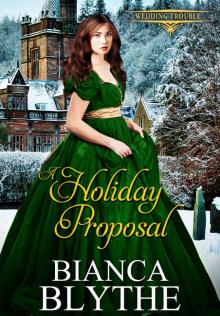 A Holiday Proposal (Wedding Trouble Book 6)
A Holiday Proposal (Wedding Trouble Book 6) The Earl's Christmas Consultant (Wedding Trouble Book 3)
The Earl's Christmas Consultant (Wedding Trouble Book 3) A Kiss for the Marquess (Wedding Trouble Book 5)
A Kiss for the Marquess (Wedding Trouble Book 5) My Favorite Duke (The Duke Hunters Club Book 2)
My Favorite Duke (The Duke Hunters Club Book 2)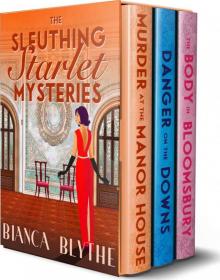 The Sleuthing Starlet Mysteries
The Sleuthing Starlet Mysteries Lords, Snow and Mistletoe
Lords, Snow and Mistletoe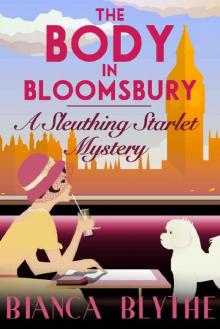 The Body in Bloomsbury
The Body in Bloomsbury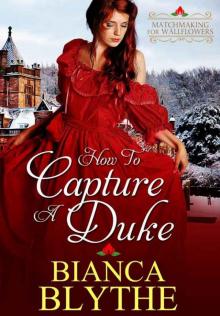 How to Capture a Duke (Matchmaking for Wallflowers Book 1)
How to Capture a Duke (Matchmaking for Wallflowers Book 1) Don't Tie the Knot
Don't Tie the Knot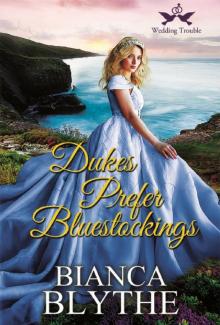 Dukes Prefer Bluestockings
Dukes Prefer Bluestockings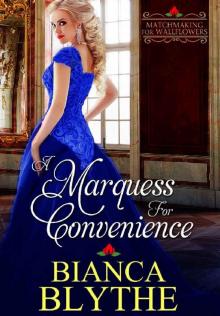 A Marquess for Convenience (Matchmaking for Wallflowers Book 5)
A Marquess for Convenience (Matchmaking for Wallflowers Book 5) Lords, Snow and Mistletoe: A Regency Christmas Collection
Lords, Snow and Mistletoe: A Regency Christmas Collection Don't Tie the Knot (Wedding Trouble Book 1)
Don't Tie the Knot (Wedding Trouble Book 1)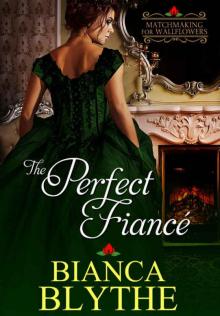 The Perfect Fiancé (Matchmaking for Wallflowers Book 0)
The Perfect Fiancé (Matchmaking for Wallflowers Book 0)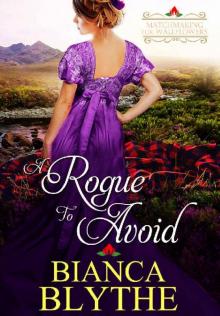 A Rogue to Avoid (Matchmaking for Wallflowers Book 2)
A Rogue to Avoid (Matchmaking for Wallflowers Book 2)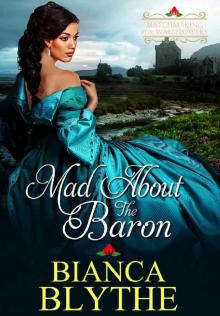 Mad About The Baron (Matchmaking for Wallflowers Book 4)
Mad About The Baron (Matchmaking for Wallflowers Book 4)